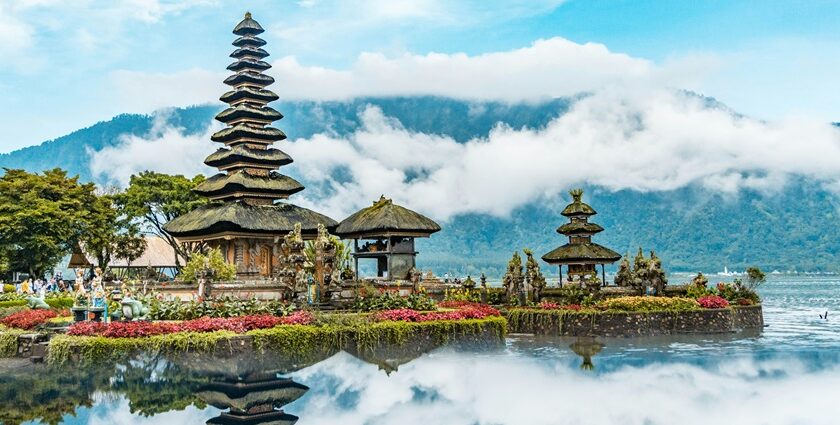Festivals in Bali blend celebration, spirituality, and vibrant cultural traditions. Known as the “Island of the Gods,” Bali hosts countless ceremonies throughout the year, from grand temple rituals to small village gatherings. These events showcase traditional dances, purification rites, colourful parades, and deep-rooted Hindu customs passed down through generations. The famous Nyepi, or Balinese New Year, is marked by silence and reflection, while other festivals bring music and movement to the streets. Together, these diverse celebrations offer a rich glimpse into Balinese life, connecting communities with their ancestors and offering unforgettable experiences to visitors.
Top 10 Festivals In Bali
Discover the top festivals in Bali, each offering unique experiences for spiritual seekers, culture lovers, and curious travellers exploring the island’s rich traditions.
1. Nyepi
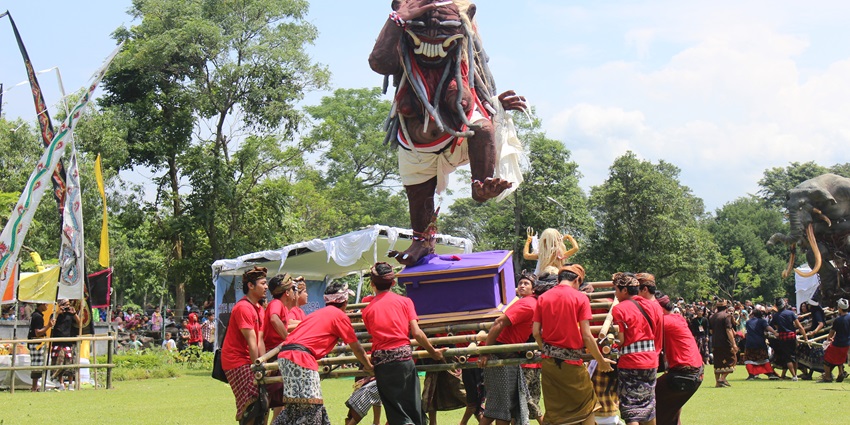
Photo: FaizAttariqi / Wikimedia Commons
Nyepi is also called the Balinese New Year. It falls in March based on the Balinese Saka calendar. The other New Year festivities are surrounded by fireworks and parties, but not Nyepi. The whole island grinds to a stop, no flying, no traffic, no work, and no play. Even tourists must remain indoors, switch off lights, and join in the peaceful atmosphere. The day before is its exact reverse. The island is awash with vibrant parades of giant, handmade monsters called Ogoh-Ogoh. The giant monsters are meant to represent evil spirits and are put on fire at sunset to symbolically keep evil at bay.
Location: Island-wide, Bali (celebrated across all villages, towns, and cities
Main Attractions: Ogoh-Ogoh procession, 24 hours of silence, purification rituals of culture
Suggested Read: Things To Do In Bali
2. Galungan
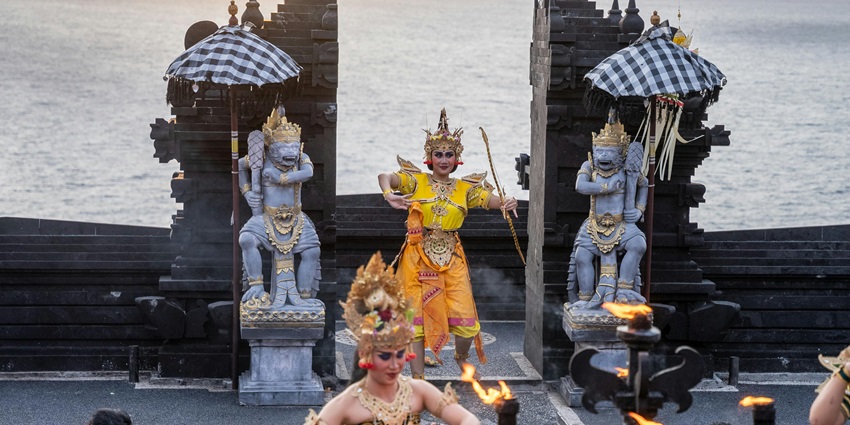
Photo: Pragyan Bezbaruah / Pexels / Image For Representation Only
Galungan is a beautiful and meaningful Bali holiday, which is celebrated every 210 days according to the Balinese Pawukon calendar. The celebration commemorates good (Dharma) triumphing over evil (Adharma) and makes the island culturally vibrant, lively, and festive. One of the finest aspects of Galungan could perhaps be creating penjor – bamboo stalks that are tall, decorated with coconut leaves, fruits, and offerings. These are spread outside temples and houses, and villages and roads, and thus get festooned and look beautiful. The families give gifts, visit the temples, and wear traditional attire, and hence the atmosphere is very religious and cultural.
Location: Island-wide, Bali (celebrated at homes, temples, and streets across the island)
Main Attractions: Temple ceremonies, community activities, Penjor decorations
3. Kuningan
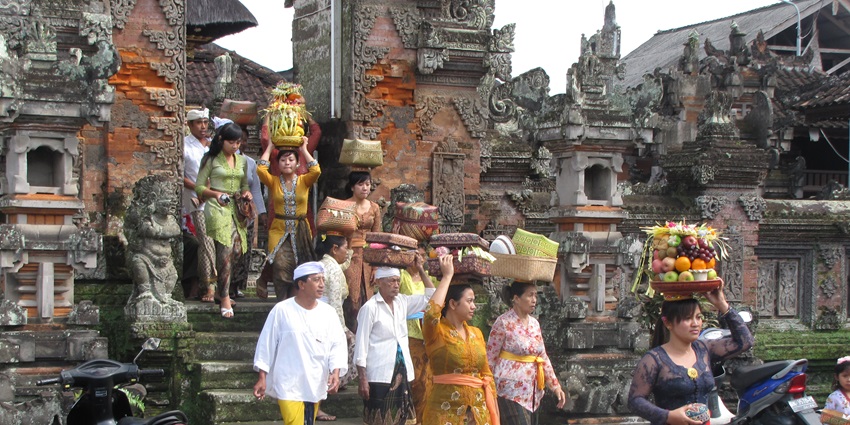
Photo: Spencer Weart / Wikimedia Commons
Kuningan is celebrated the next day to Galungan, the day when ancestral spirits, who descended to earth on Galungan, ascend again to heaven. It is a day of worship and thanksgiving, with families all over Bali conducting special offerings to their ancestors and expressing appreciation for offerings. The most significant offering is yellow rice, which denotes prosperity and wealth. Rice is mixed with flowers and fruits and gradually placed in small baskets to be left at temples and house altars. Houses and temples are decorated with beautiful ornaments, and the villages are partying in full swing every way.
Location: Island-wide, Bali (observed in temples and households throughout Bali)
Main Attractions: Yellow rice offerings, temple dances, Wayang Kulit
Suggested Read: Places To Visit Near Bali For Day Trips & Escapes
4. Saraswati Day
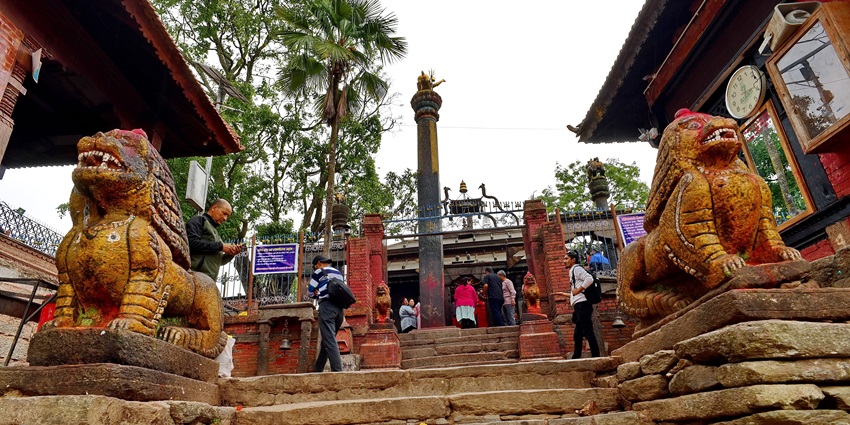
Photo: Rajesh Dhungana / Wikimedia Commons / Image For Representation Only
Saraswati Day is a festival of great significance in Bali, which is celebrated in honour of Dewi Saraswati, the goddess of arts, wisdom, and knowledge. The festival is celebrated every 210 days as per the Balinese Pawukon calendar. On Saraswati Day, the books, manuscripts, and study material are imbued with sanctity and reverence as flowers, fruits, and incense sticks. Strangely, on Saraswati Day, there is no reading and writing done on this single day in a year, but the most respect is given to the gift of knowledge. The day is also commemorated in the schools and universities with students and teachers wearing formal clothes, in their own traditional wear, praying, and offering sacrifices to the shrines.
Location: Schools, universities, libraries, and temples across Bali
Main Attractions: Celebration of books, school rituals, offerings to Dewi Saraswati
5. Pagerwesi
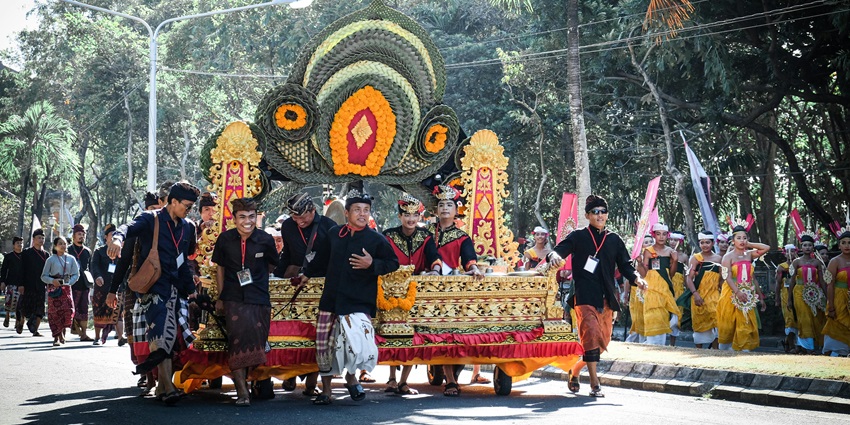
Photo: NOR KHOLIS / Pexels / Image For Representation Only
Pagerwesi, or “iron fence,” is the most significant ceremony on each 210th day of the Pawukon system. The ceremony represents the protection of the mind and soul from negative purposes, like an iron fence around a house. Members of the household gather at temples and pray for spiritual wisdom, tenacity, and light in everyday living. Priests sprinkle holy water on the masses, and masses present victuals, flowers, and fruits to shrines. Heaps of meals are prepared and distributed by most communities with neighbouring people as a symbol of oneness, sharing, and communal dwelling in the community. The festive mood reinforces Balinese faith in holding together as one force.
Location: Family temples and community temples across Bali
Main Attractions: Temple ceremonies, family reunion, holy water blessings
Suggested Read: Bali Hidden Places
6. Odalan
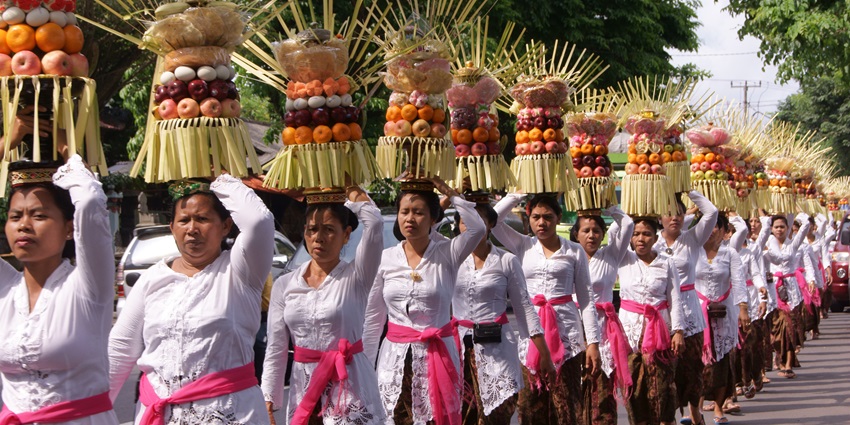
Photo: Midori / Wikimedia Commons
Odalan, positioned among the most popular and vibrant festivals of Bali, is the Balinese temple anniversary. Every temple celebrates its Odalan every 210 days according to the Balinese Pawukon calendar. With the knowledge that the island is covered with thousands of temples, Odalan celebrations are practically a day-to-day affair, thus a typical cultural event for locals and visitors alike. The temples are dressed up with delicate colours with multicoloured flags, golden umbrellas, and delicate offerings with flowers, fruits, and palm fronds throughout the daytime. The atmosphere is filled with classical dance performances such as Barong, Legong, and Kecak, to the enchanting sounds of gamelan orchestras.
Location: Various temples across Bali (each temple has its own Odalan based on its anniversary)
Main Attractions: Traditional dances, gamelan music, temple decoration
7. Tumpek Landep
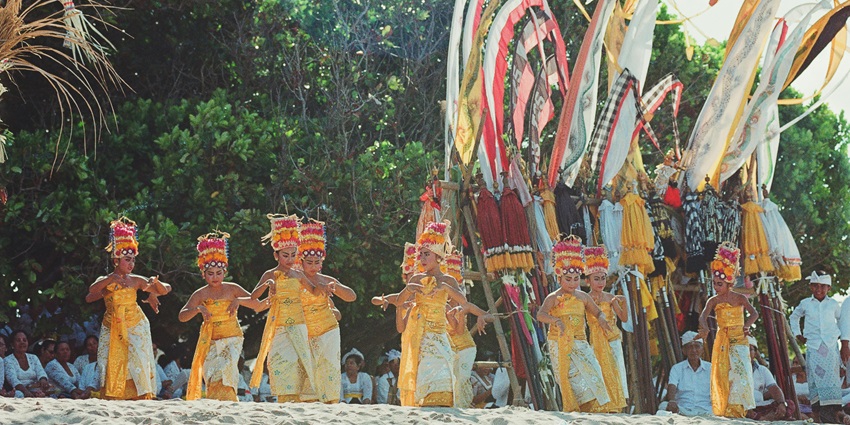
Photo: Didi Lecatompessy / Pexels / Image For Representation Only
Tumpek Landep is a very unique festival that is conducted every 210 days under the Pawukon calendar. It is on this day that Balinese bless metals such as cars, motorbikes, machines, and household tools, to comprehend their use in daily life. Not on the goods themselves, though, the festival has a higher symbolic value than that, to cleanse the mind, intelligence, and spirit, as metal is cleansed in preparation for use and being potent. Palm-leaf adornments, flowers, and foods, as well as incense, are affixed to the houses’ vehicles and tools. Priests perform rituals, showering sacred water to call forth protection, fortune, and safety with these commodities.
Location: Island-wide, mainly in homes, workshops, and roads where vehicles and tools are kept
Main Attractions: Decorated automobiles, sanctification of appliances, ritual ceremonies
Suggested Read: Places To Visit In Bali With Family
8. Tumpek Kandang
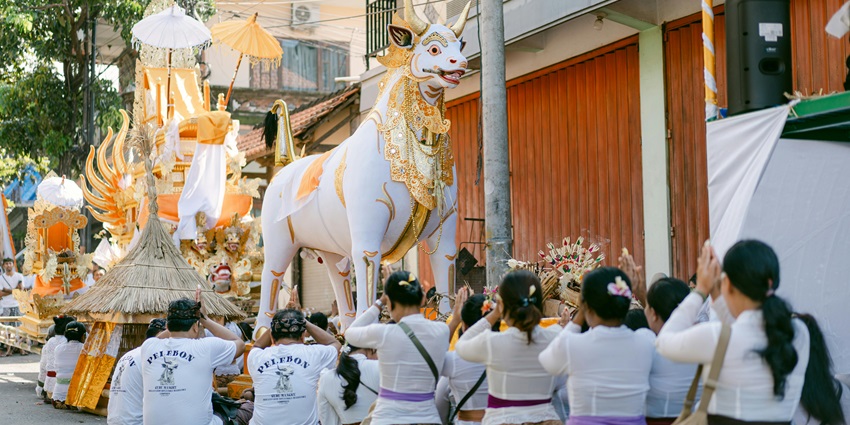
Photo: Arjun Adinata / Pexels / Image For Representation Only
Tumpek Kandang is an important Balinese festival for the act of expressing gratitude to animals as priceless assets in everyday life and traditional farming. It is being celebrated every 210 days and indicates the esteem that the Balinese people have for cows, pigs, chickens, ducks, and even domestic pets for giving back to family and society. Family and farmers specifically perform special offerings of incense, flowers, and food, which are presented to animals. They didactically adorned flowers, palm leaf ornaments, and sacred water splashes during priest ceremonies, symbolising their petition for protection, productivity, and health.
Location: Farms, homes, and livestock areas across Bali
Main Attractions: Prayers done on animals, agriculture rituals, Tri Hita Karana philosophy
9. Tumpek Uduh
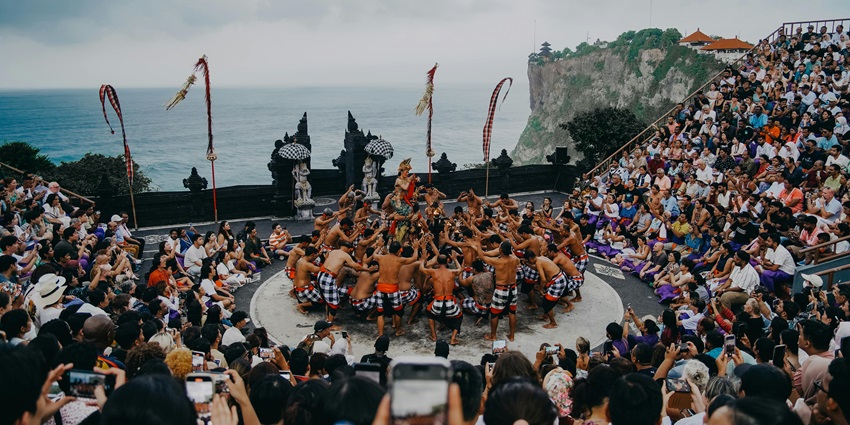
Photo: Habel Panggalo / Pexels / Image For Representation Only
The festival is established every 210 days by the Pawukon calendar, and it is a tree-crop-nature festival that provides support to mankind. Farmers and villagers perform this day and converge on their plantations and fields, and offer coconut leaves, flowers, and fruits. Trees are generally adorned with sacred cloths as a gesture of respect and gratitude for their life-giving abilities. There are prayers afterwards being chanted, praying for fertility, pest immunity, and plentiful harvests in the next harvest periods. Tumpek Uduh is not just a ritual; it’s an expression of the Balinese philosophy Tri Hita Karana, trying to achieve harmony between humans, nature, and God.
Location: Rice fields, plantations, gardens, and community green spaces across Bali
Main Attractions: Blessings in rice fields, decorated trees, and eco-spiritual philosophy
Suggested Read: Festivals In Indonesia That Celebrate Culture, Faith, And Local Community Traditions
10. Bali Arts Festival
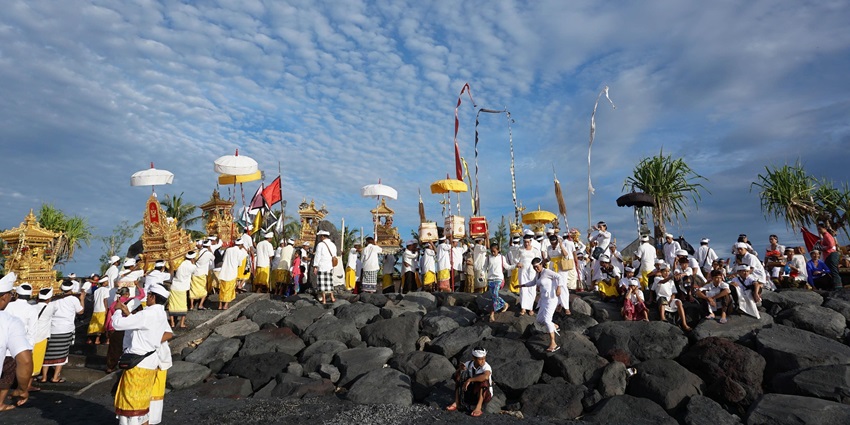
Photo: alitdesign / Pixabay / Image For Representation Only
The Bali Arts Festival, staged annually in Denpasar between June and July, is the island’s largest culture festival and a pilgrimage for islanders and visitors alike. It lasts one month, transforming the city into a whirlwind of activity honouring Balinese dance, music, drama, crafts, and food heritage. The procession at the beginning is a jaw-dropping spectacle of island talent with thousands of performers from throughout Bali parading down the streets in ornate regalia, waving flags, and performing on the sidewalk. At the festival, temples, cultural centres, and public places undergo daily performances from new art forms to traditional ceremonies.
Location: Denpasar, Bali (main events held at Taman Werdhi Budaya Art Centre)
Main Attractions: Parades, traditional dances, craft demonstrations, cultural workshops
Celebrate the vibrant festivals in Bali, where spirituality and culture come alive through sacred rituals, temple ceremonies, and colourful parades. Each event reveals the island’s rich heritage and the warmth of its people. From Hindu traditions to multicultural shows, festivals in Bali offer magical moments for every traveller. Experience devotion, tradition, and joy woven together. Book your tour with TripXL and discover the true spirit of Bali through its festivals.
Cover Photo: Guillaume Marques / Unsplash / Image For Representation Only


 WhatsApp
WhatsApp
 Twitter
Twitter
